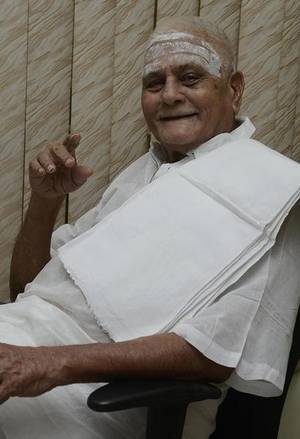Legendary cook and wedding caterer Arusuvai Arasu Natarajan passed away after six decades of cooking and catering to 75,000 weddings. MetroPlus looks back on his life and career
At an early morning photo shoot for an interview for this newspaper in 2016, Arusuvai Arasu Natarajan, was raring to go. He strode into the kitchen of Rani Meiyammai Hall in Egmore, heading straight to the vegetables to check if they were cut in the required shapes to go into the varied dishes planned for lunch.
Then, he headed to his favourite corner of the kitchen — the dosa counter. He folded his veshti, cleaned the griddle, and scooped ladle after ladle of batter, shaping each into perfect circles, drizzling it with ghee and sending out crisp, perfectly golden dosas. He was 88 years old then, yet worked with quick precision, shoulder to shoulder with younger cooks. That devotion to work, says his youngest daughter Sowmya Ramesh, is the legacy he leaves behind. The legendary cook passed away on September 17, after six decades of catering to about 75,000 weddings. He continued working till the very end. “Even until recently, he would visit the kitchen, check the menu for discrepancies, and monitor things before heading home,” says Sowmya.
A student and a master
“My father was like this banyan tree under whose shadow we learnt and flourished,” says Sowmya. “Till the very end, he kept egging us to improve our craft. You can gauge his popularity by the fact that generations of one family would come to book appa for their family functions. He was like a part of their family. He has trained many people in cooking, and if they left to branch out on their own, he was happiest that he had trained someone in a life skill.”
She says that he was also particular about adapting to change with an open mind. Although he loved cooking with firewood, something he believed lent food great flavour, he learnt to cook using steam. When awareness about usage of plastic grew, the family scouted for alternatives and zeroed in on arecanut leaf sheath serving bowls and plates, as well as those made of sugarcane extract. “At every step, appa was a student, learning from contemporary trends and techniques,” says Sowmya.
In a previous interview, he described how his first lesson was how to recover from a culinary disaster. When he was 11 years old, and working with his grandfather Subramania Iyer, he was asked to add chopped okra into a hot wok to make a dry curry. The young child lifted up eight kilograms of the vegetable, dropped it into the wok and added water to help it cook faster. In a while, he saw the wok was a slimy mess. His grandfather then taught him something that guided Natarajan for the rest of his life — ‘There are no mistakes in cooking. Think out of the box to set it right.’ Hence, the vegetable turned into a delectable kootu.
First among equals
Natarajan’s contemporary in Chennai was the equally legendary LV Pattappa, who specialised in Iyengar cuisine. His son Balaji says the family has fond memories of interactions with Natarajan mama. “Both he and my father started from the basics, and both believed in setting an example with their work. Mama knew the difficultly of working in the kitchen, and admired anyone who shared that ability,” says Balaji. He adds that Natarajan loved the akkara vadisal that Patappa made, as well as the traditional cashew nokkal.
To this master chef, food was divine, and those cooking it were nothing less. He spoke fondly of a cook in Palakkad who stirred a payasam for eight hours, and once done, dropped in some tulsi leaves and prayed to the creamy concoction. “At that moment, he was God!” he used to say.
Till the very end, Natarajan revered the kitchen. “Cooking is more than just putting together spices and vegetables to create a delicious dish. It’s a job you do with your heart,” he would say. Then add: “I cooked for a living; cooking gave me life.”








